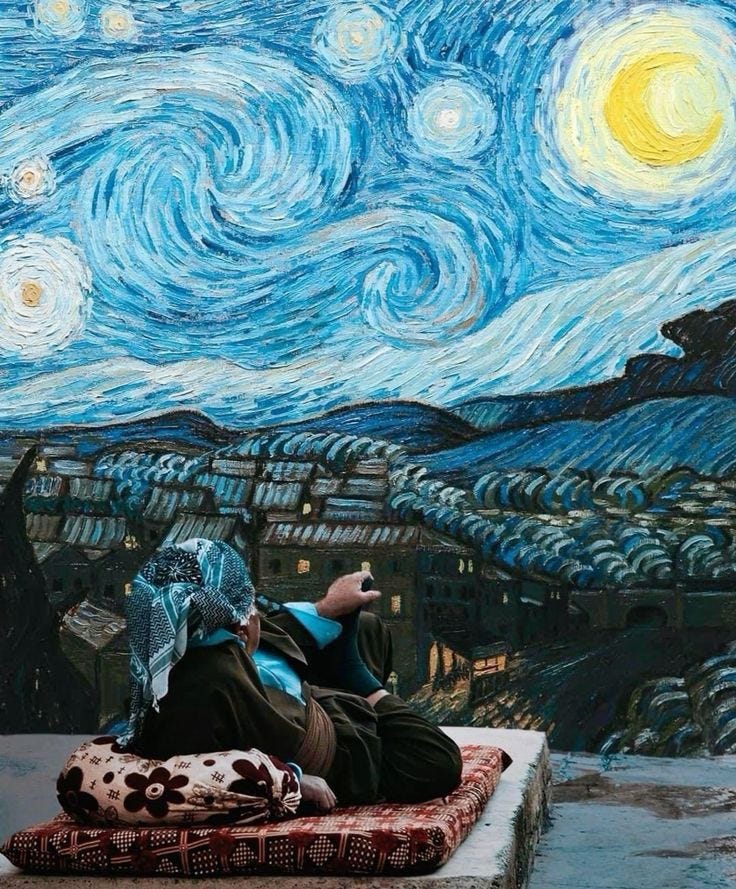KURDISH PHILOSOPHY: THE ONTOLOGY OF TEA, THE EPISTEMOLOGY OF HALAY, AND THE QUEST FOR BEING AMIDST VIBRATING ZILGITS
I'm a Kurd, my friend.
Which means I contemplate a bit and throw a zılgıt (ululation) a bit every day.
Because for us, an existential crisis begins with breakfast.
Mom: “Breakfast is ready, come.”
Me: “Mom, I haven't yet unraveled the meaning of my existence.”
Mom: “Come to breakfast; you can't question life on an empty stomach!”
What is philosophy?
Socrates would say: “An unexamined life is not worth living.”
A Kurdish uncle would say: “Son, don't overthink; you'll lose your mind.”
I'm somewhere in between: I question, but I also feed myself.
But where is true philosophy practiced?
While brewing tea.
The brew of tea is a metaphor:
Nietzsche says, “Man is something that shall be overcome.”
Our tea master uncle says: “I brewed this tea a bit stronger; it overcomes man.”
And at that moment, Nietzsche falls silent, for everyone falls silent before Kurdish tea.
Halay: The Embodiment of Being Through Dance
Halay is an art, a form of resistance, a metaphysics.
The halay leader is the "perfect leader" existing in Plato's world of ideas.
With a handkerchief in hand, they guide, govern the community with rhythm.
They are a philosopher, speaking through their body:
“Come here, turn from here, rejoice here, now jump!”
Each step is a theory, each turn a thesis-antithesis-synthesis cycle.
Halay is collectivism.
You can't ponder "who am I" there because you all are someone together.
If one person falls behind, the whole system collapses.
So Hegel's dialectic begins with synchronizing the left foot for us.
Zılgıt: The Cosmic Sound of the Inner Scream
Zılgıt...
From the outside, it sounds like just a noise, but it's actually a philosophical declaration.
It can't be explained with Aristotelian logic. Because:
Zılgıt isn't logical.
Zılgıt is truth.
Zılgıt is sincere.
Zılgıt is uttered!
It's uttered in sorrow and in joy.
A wedding without zılgıt, according to Kant, is “morally deficient.”
Aunt Phenomenology:
The Kurdish aunt embodies Husserl's phenomenology in her fingertips.
Because she feels without seeing,
knows without hearing,
decides without asking.
She looks at you and says:
“You seem ready for marriage.”
You: “Aunt, I'm 20 years old.”
Aunt: “I've even imagined your wedding dress.”
And there, being reveals itself.
Ethics in Kurdishness: It's a Shame Not to Eat
In philosophy, ethics is the debate between right and wrong.
In Kurdish culture, ethics begins with refusing dolma (stuffed grape leaves).
If you refuse dolma:
You're wrong in the eyes of God,
In the eyes of the aunt,
And in the eyes of the uncle.
So Kant's definition of a “good-willed action” for us is eating dolma.
Tea and Ontology
Kurdish tea isn't just tea.
It's an indicator of existence.
It's a declaration of peace.
It's an attempt to balance the universe.
Nietzsche spoke of the “will to power,” and for us, it's hidden in the brew of tea.
The person who makes good tea can govern the universe.
Conclusion:
We're Kurds, my friend.
We start with halay, deepen with tea, rise with zılgıt.
Our culture isn't just a tradition; it's a philosophy.
And this philosophy doesn't live in dry definitions or footnotes.
It is lived.
In an aunt, in a tea glass, right in the middle of a halay.
And with this culture, we laugh, we think, we love,
But we never remain “normal.”
Because Kurdish philosophy is everything a bit more emotional, a bit more enthusiastic, a bit more zılgıt-filled.
~ZAREMM🩵
Philosophy? Check. Culture? Check. Now let the music take the lead!
I have chosen the most entertaining Kurdish songs that fit the spirit of this piece. Click on this write with a single touch to join the halay!💖🩷





You really captured the beauty of Kurdish culture with this one! Gelek spas! ✌🏼❤️☀️💚
Such a lovely read. You managed to bring to mind visions of love and celebration. Then I suddenly thought of the similarities to my own celtic heritage. Just lovely thank you.